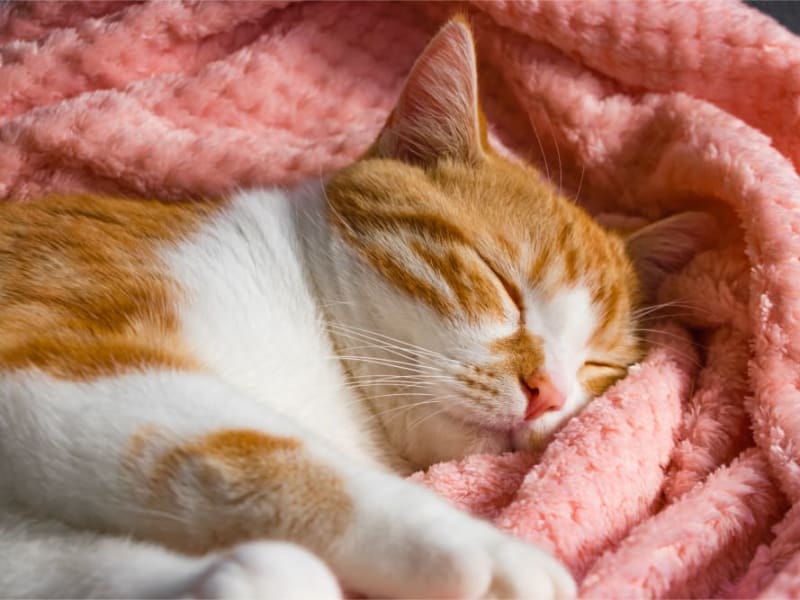Why do cats sleep so much?
Cats have developed the ability to sleep for extended periods of time throughout the day. To save energy for hunting, chasing, and killing their next meal, wild cats must sleep.
Although our house cats may not need to hunt, the instinct to sleep and prepare for the hunt carries on.
How many hours does a cat sleep?
The number of hours that your cat needs to sleep and the typical sleeping pattern for your cat will change as they get older:
- Kittens will likely sleep most of the day, with a few brief bursts of energy between meals.
- Adolescent cats may have erratic sleep patterns combined with periods of intense playfulness.
- Adult cats tend to have more set sleeping schedules that average out at about 12 - 20 hours of sleep each day.
- Senior cats will tend to have less energy and reduced mobility which means they will sleep more than younger cats.
Once your cat reaches adulthood, you'll notice that he or she develops a recognizable sleeping and waking pattern. For example, you might notice that your cat gets up just before you do in the morning, spends an hour or two eating and socializing with you, and then goes back to sleep while you go about your business.
Is my cat really asleep?
Cats sometimes, but not always, sleep deeply. Cats, like people, are frequently found snoozing. Light sleeping accounts for roughly 3/4 of your cat's sleep time, with deep sleep accounting for only 1/4 of their total sleep time.
Cats get the rest they need while snoozing lightly, but they remain alert. You may notice that your cat's eyes remain slightly open while snoozing or napping, or that their ears twitch and rotate in response to noises.
When should I be concerned?
It's not about knowing your cat's normal sleep patterns and recognizing when that pattern changes significantly; rather, it's about knowing your cat's normal sleep patterns and recognizing when that pattern changes significantly.
If your cat begins to sleep a lot more or a lot less than is usual for him/her there may be a health issue, it's time to visit your vet.
Cats who begin to sleep more than usual could be ill or experience pain. On the other hand, if your cat begins sleeping less than usual it may be suffering from hyperthyroidism or other conditions.
If you are concerned about your cat's health after your regular vet has closed, contact our Clemmons vets.
Looking for a vet in
Clemmons?
We're always accepting new patients, so contact our veterinary hospital today to book your pet's first appointment.
Related Articles View All
How often do you take a cat to the vet?
Regular checkups including vaccines and parasite control play a key role in helping your kitty achieve a long and healthy life. So, how often should you take a cat to the vet? Today we share general guidelines recommended by most veterinarians.
Exploring Cat Dental Health - Gingivitis
Is your cat refusing to eat, or losing weight? It could be due to a dental health problem such as gingivitis. Read on to learn about the signs and how gingivitis in cats can be treated.
The Best Way to Travel With a Cat
Planning a trip away from home and want to take your feline friend along with you? Here are a few helpful tips from our Clemmons team to help make the journey an enjoyable experience for both you and your cat.
Kitten First Vet Visit - What to Expect & What it Will Cost
Have you welcomed a beautiful new kitten into your heart and home? If so, early veterinary care can help to set your tiny fur baby on the path to excellent life-long health. Today, our Clemmons vets discuss kitten first vet visits.
How to Tell if Your Cat Has a Broken Leg
Regardless of whether your cat is a curious outdoor explorer or a chilled-out homebody, accidents can happen. Today, our Clemmons vets share signs that may indicate that your cat has a broken leg, and what you should do.

